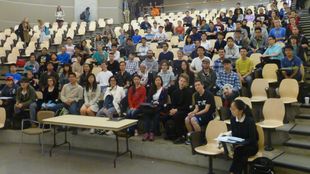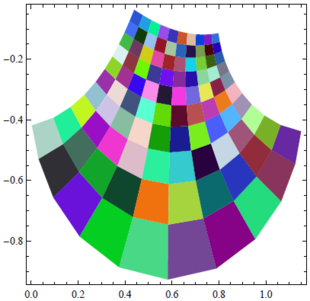14-240/Tutorial-November11: Difference between revisions
From Drorbn
Jump to navigationJump to search
| Line 5: | Line 5: | ||
====Coordinate and Matrix Representation Problems==== |
====Coordinate and Matrix Representation Problems==== |
||
Let <math>V</math> be a finite dimensional vector space over a field <math>F</math>, <math>B = \{v_1, v_2, v_3, ..., v_n\}</math> be an ordered basis of <math>V</math> and <math>v \in V</math>. Then <math>v = \displaystyle\sum_{i=1}^{n} c_iv_i</math> where <math>c_i \in F</math>. Then the '''coordinate |
Let <math>V</math> be a finite dimensional vector space over a field <math>F</math>, <math>B = \{v_1, v_2, v_3, ..., v_n\}</math> be an ordered basis of <math>V</math> and <math>v \in V</math>. Then <math>v = \displaystyle\sum_{i=1}^{n} c_iv_i</math> where <math>c_i \in F</math>. Then the '''coordinate vector''' of <math>v</math> relative to <math>B</math>is the column vector <math> \begin{pmatrix}c_1\\c_2\\c_3\\...\\c_n\end{pmatrix}</math>. |
||
Let <math>W</math> be a finite dimensional vector space over the same field <math>F</math> and <math>K = \{v_1, v_2, v_3, ..., v_m\}</math> be an ordered basis of <math>W</math>. Define a linear transformation <math>T:V \to W</math>. Then <math>T(v_j) = \displaystyle\sum_{i=1}^{m} c_{ij}T(v_j)</math> where <math>c_{ij} \in F</math>. Then the '''matrix representation''' of <math>T</math> in the ordered bases <math>B, K</math> is the matrix <math>\begin{pmatrix}c_{11} & c_{12} & c_{13} & ... & c_{1n}\\c_{21} & c_{22} & c_{23} & ... & c_{2n}\\c_{31} & c_{32} & c_{33} & ... & c_{3n}\\c_{21} & c_{22} & c_{23} & ... & c_{2n}\\... & ... & ... & ...& ... \\c_{m1} & c_{m2} & c_{m3} & ... & c_{mn}\end{pmatrix}</math>. |
Let <math>W</math> be a finite dimensional vector space over the same field <math>F</math> and <math>K = \{v_1, v_2, v_3, ..., v_m\}</math> be an ordered basis of <math>W</math>. Define a linear transformation <math>T:V \to W</math>. Then <math>T(v_j) = \displaystyle\sum_{i=1}^{m} c_{ij}T(v_j)</math> where <math>c_{ij} \in F</math>. Then the '''matrix representation''' of <math>T</math> in the ordered bases <math>B, K</math> is the matrix <math>\begin{pmatrix}c_{11} & c_{12} & c_{13} & ... & c_{1n}\\c_{21} & c_{22} & c_{23} & ... & c_{2n}\\c_{31} & c_{32} & c_{33} & ... & c_{3n}\\c_{21} & c_{22} & c_{23} & ... & c_{2n}\\... & ... & ... & ...& ... \\c_{m1} & c_{m2} & c_{m3} & ... & c_{mn}\end{pmatrix}</math>. |
||
Boris's Problems: |
|||
Let <math>S</math> be the standard ordered basis of <math>P_n(F)</math>. |
|||
'''Q1'''. What is the '''coordinate vector''' of <math>x^2 + x^5</math> relative to <math>S</math>? |
|||
'''Q2'''. Let <math>T:P_n \to F</math> be a linear transformation that is defined by <math>T(f) = f(0)</math>. What is the '''matrix representation''' of <math>T</math> in <math>S</math>? |
|||
Revision as of 20:02, 29 November 2014
| |||||||||||||||||||||||||||||||||||||||||||||||||||||||||
Boris
Coordinate and Matrix Representation Problems
Let be a finite dimensional vector space over a field , be an ordered basis of and . Then where . Then the coordinate vector of relative to is the column vector .
Let be a finite dimensional vector space over the same field and be an ordered basis of . Define a linear transformation . Then where . Then the matrix representation of in the ordered bases is the matrix .
Boris's Problems:
Let be the standard ordered basis of .
Q1. What is the coordinate vector of relative to ?
Q2. Let be a linear transformation that is defined by . What is the matrix representation of in ?























